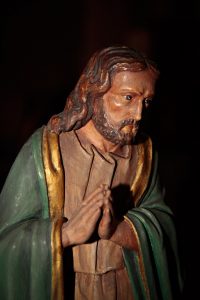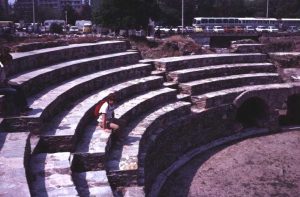The Society of Biblical Literature (SBL) is one of the premier professional organizations for scholars and students of religion around the world. While “religion” is often equated in the public’s mind with church-going or participation in other religions such as Judaism and Islam, it is also a discipline bounded by scholarly and ethical standards, evidence, terminology, and methodology. Because the mainstream media often covers stories with religious themes primarily in the context of extreme belief or even violence – radical Islam and terrorism, the Christian right with its emphases on abortion, same-sex marriage and capital punishment, or the Roman Catholic sex abuse scandal – it is vitally important for the general public to understand religion as an important academic field, on a par with medicine, law, the sciences, the social sciences, and so on. 
With a membership of nearly 8,200 scholars, teachers, students, religious leaders, and individuals from over 100 countries, SBL brings together at an Annual Meeting an immense gathering of scholars in biblical scholarship, religious studies and theology. The Meeting hosts over 1,200 academic sessions and workshops, as well as “one of the world’s largest exhibits of books and digital resources for biblical studies.”
The 2017 Annual Meeting was held in Boston this year, and I was fortunate to be able to attend. A closer look at some of the papers and discussions I heard will give a sense of the range of topics religion scholars are currently treating in their books, articles, classrooms, and archaeological excavations. The presentations also show how state-of-the-art technologies, scientific tools and breakthroughs are impacting the field of religious studies. When religious literacy can be enhanced by scholarship, we as a society can better understand each other and perhaps even find ways to promote peace and harmony around the world.
In the SBL, a “section” is a program unit with a six-year term that “offers presenters [the] most access for unsolicited papers” and can “include paper readings, panel discussions, and workshops.” (Other program units include three-year Consultations and six-year Seminars.) Some of the Sections I attended covered areas such as Archaeology of Religion in the Roman World, Polis and Ekklesia: Investigations of Urban Christianity, Poverty in the Biblical World, and Early Christianity and the Ancient Economy. As one can see even at a quick glance, SBL members deal not only with esoteric and scholarly topics but also with issues of great importance to us today.
- In a packed session on the Historical Jesus, where the theme was Jesus and Slavery, dynamic papers challenged traditional interpretations of well-known stories about Jesus and his followers. For instance, Ronald Charles of St. Francis Xavier University in Nova Scotia, in “(Re)imagining the Slave in the Gospels,” pointed out that slaves in the gospels are rarely depicted as real human beings. They are props in stories to reveal something about Jesus, not to challenge the institution of slavery or humanize subjected peoples.

- A presentation by Cavan Concannon (University of Southern California) on the issue of class in antiquity, especially the contemporaries of St. Paul, utilized the work of three French thinkers in his analysis, noted that there has been a return to a Marxist sensibility, and encouraged scholars to return to the issues of wealth and poverty to analyze the ancient world. This in turn would better inform how we understand Christian theology and practice.
- A paper on fines assessed in private associations during the Roman Empire helps us better understand the sociological context in which Christianity developed.
- A presentation on land distribution in Palestine in the early third century CE showed that some land was owned by women.
In our American culture, we have long been surrounded and negatively impacted by violence. In an SBL Section on Violence and Representations of Violence in Antiquity, we heard five challenging papers, two of which focused on Judges 19 and its gruesome story of a concubine who was raped then cut into 12 pieces. Two other papers examined violence in Revelation 3:19 and Luke 23:41. While not everyone will agree with presenters’ interpretations, these types of examinations, which generally utilize close scrutiny of the passages in their original languages, move scholarship forward and help us to realize that there is often more than one way to view a difficult passage in the Bible.
 Archaeological excavations in the Mediterranean have long been featured at the Annual Meeting. Presenters offered insights from recent excavations at Thessaloniki, Ostia, Ephesus, Rome, Corinth and other New (Christian) Testament sites; their work significantly broadens our understanding of the Empire in which Jews and the earliest Christians lived.
Archaeological excavations in the Mediterranean have long been featured at the Annual Meeting. Presenters offered insights from recent excavations at Thessaloniki, Ostia, Ephesus, Rome, Corinth and other New (Christian) Testament sites; their work significantly broadens our understanding of the Empire in which Jews and the earliest Christians lived.
In a Section on Archaeology of Religion in the Roman World, one session had the theme of Ritual and Religion on the City Streets of the Empire. Tina Shepardson of the University of Tennessee, Knoxville, in a paper entitled “Seductive Spectacles: Competing for Congregants in Late Antique Antioch,” examined fourth-century spectacles such as theater events and festivals. The Archbishop of Constantinople and early church father John Chrysostom complained that those events, which could be quite loud and boisterous, competed with his and others’ sermons, much to their consternation! The festivals enticed onlookers to join their groups – an effective recruiting technique. Chrysostom and his fellow Christian clergy tried to entice people instead to “decorate their souls” by offering quiet contemplative alternatives. But Christians also developed their own processionals, etc., in hopes of attracting converts. This discussion shows that pagan groups still competed with Christianity into the early fifth century.
The site of Megiddo in Israel has a long and important history. “Megiddo is the only site in Israel mentioned by every great power in the ancient Near East. In the New Testament it appears as Armageddon, . . . location of the millennial battle between the forces of good and evil.” 
The extensive site of Megiddo has been under excavation for over 100 years. In a Section on the Archaeology of the Biblical World with the theme, The Megiddo Excavations: New Studies Reflecting on the Archaeology and History of Ancient Israel and Beyond, six speakers, using slides, presented updates on a wide range of issues. Two papers discussed recent DNA advances. Others covered topics such as the withdrawal of Egypt and the arrival of the Philistines, iron working and the Megiddo cult. Archaeological exploration enhances our understanding of our ancestors, broadens our appreciation for beliefs and practices other than our own, provides hands-on experience for volunteers of all ages, and promotes international cooperation.
Finally, the SBL Annual Meeting regularly coincides with that of the American Academy of Religion, and Westar Institute holds one of its meetings on the Friday before the SBL/AAR Annual Meeting begins. As a Fellow of Westar Institute, I attended one session each of the two Seminars: the Christianity Seminar: Ritual Life in the Early Christ Movement and the Seminar on God and the Human Future: Religious Naturalism. The latter was particularly challenging in conjunction with our current national conversation: Carol Wayne White of Bucknell University connected “religious naturalism to critical race theory and highlight[ed] it as an important theoretical resource for contemporary social movements like Black Lives Matter.”
Religious literacy in the United States in the 21st century is vitally important. Religion cuts across and informs nearly all aspects of our lives, in one way or another, for better or worse. It behooves all of us to be as knowledgeable as possible about religious issues, how religion can be misused and twisted toward unscrupulous ends and how religion and religious people can help create the kind of society most of us want.
Here are a few resources for those who might wish to educate themselves.
Westar Institute
Laypeople are welcome to join as Associates. Westar also sponsors Jesus Seminars on the Road around the country, which are geared toward the general public.
The Christian Century
This highly-regarded bi-weekly progressive, ecumenical magazine is “committed to thinking critically and living faithfully.”
Religious Literacy Project of Harvard Divinity School
Religious Literacy Project of Brown University
